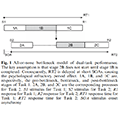Abstract
It has been argued that the psychological refractory period (PRP) effect is eliminated with two ideomotor compatible tasks when instructions stress fast and simultaneous responding. Three experiments were conducted to test this hypothesis. In all experiments, Task 1 required spatially compatible manual responses (left or right) to the direction of an arrow, and Task 2 required saying the name of the auditory letter A or B. In Experiments 1 and 3, the manual responses were key presses made with the left and right hands, whereas in Experiment 2 they were left–right toggle-switch movements made with the dominant hand. Instructions that stressed response speed reduced reaction time and increased error rate compared to standard instructions to respond fast and accurately, but did not eliminate the PRP effect on Task 2 reaction time. These results imply that, even when response speed is emphasized, ideomotor compatible tasks do not bypass response selection.
